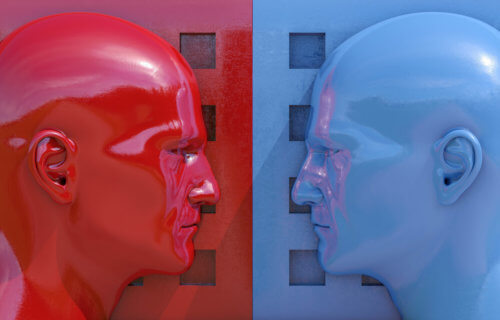COLUMBUS, Ohio — Brain scans can actually predict which political party someone supports, a new study reveals. A team from The Ohio State University found that certain “signatures” in the brain accurately line up with how someone leans politically — as either conservatives or liberals.
“Can we understand political behavior by looking solely at the brain? The answer is a fairly resounding ‘yes,’” says study co-author Skyler Cranmer, the Phillips and Henry Professor of Political Science at Ohio State, in a university release.
“The results suggest that the biological and neurological roots of political behavior run much deeper than we previously thought.”
The team adds that this study is the largest to date using MRI scans of the brain to examine political ideology. Researchers also looked at functional connectivity within the brain and its connection to a person’s political leaning. Functional connectivity refers to how different regions of the brain display similar patterns of activity when someone performs certain tasks. Simply put, these regions all communicate and work together when focusing on a task.
Your brain is talking politics — even when you’re not!
Study authors used state-of-the-art artificial intelligence programs and other resources at the Ohio Supercomputer Center to analyze the brain scans. They found strong connections between those scans and how participants answered questions gauging their political ideology on a six-point scale — going from “very liberal” to “very conservative.”
Interestingly, the eight tasks the 174 participants completed during this test did not focus on politics! Even so, their answers gave researchers an indication of how they lean politically and matched up with differences in the MRI results.
“None of the eight tasks was designed to elicit partisan responses,” says study co-author Seo Eun Yang, a former doctoral student at Ohio State. “But we found the scans from all eight tasks were related to whether they identified as liberals or conservatives.”
Moreover, even when the participants just sat quietly and didn’t think about anything, the MRI scans reveal differences in how the brains of conservatives and liberals look.
“Even without any stimulus at all, functional connectivity in the brain can help us predict a person’s political orientation,” says co-author James Wilson, assistant professor of psychiatry and biostatistics at the University of Pittsburgh School of Medicine.
Which parts of the brain predict your political party?
Study authors note that three of the eight tasks participants completed created the strongest links to political affiliation. One was an empathy test, where the group viewed images of neutral, happy, sad, or fearful faces. The second tested episodic memory and the third involved a reward task, where participants won money based on how fast they pressed a button.
However, only the reward task accurately predicted political extremism among participants who were either very conservative or very liberal.
“More work needs to be done to understand the relationship of reward decision-making with extreme political views,” Wilson says. “The results with the empathy task suggest that political thought may be closely tied to emotion and emotional response.”
Although the study has found a link between the brain and politics, researchers can’t say for sure what causes it. Despite that, they discovered that brain activity in the amygdala, inferior frontal gyrus, and the hippocampus all display the greatest connection to determining which party someone follows.
“What we don’t know is whether that brain signature is there because of the ideology that people choose or whether people’s ideology is caused by the signatures we found,” Cranmer concludes. “It also could be a combination of both, but our study does not have the data to address this question.”
The study is published in the journal PNAS Nexus.


Baloney! This study didn’t look at how people actually vote but how they “identify” politically, a totally subjective thing. This “study” is about as scientific as astrology!